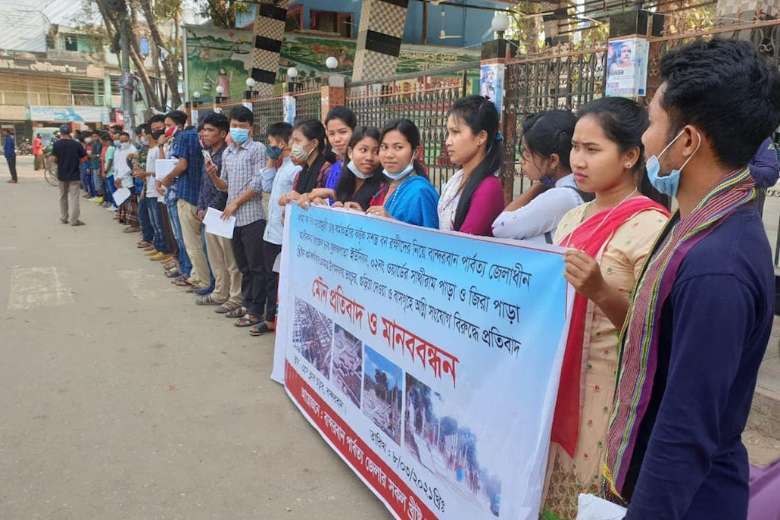Christians in Bangladesh say they are being persecuted after the demolition of a new church building in the remote Chittagong Hill Tracts region. About 200 Catholics and Protestants formed a human chain and held a silent protest on March 8 against the demolition of the Seventh-day Adventist Church building. A group of about 10 persons including forest officials demolished the under-construction church building in Sathiram Tripura village of Bandarban district on Feb. 25.Angry Christians sought assurances of their right to practice their religion and demanded compensation for the loss of the church building. In a written statement, they said Christians in the area had been victims of terrorism, with churches demolished and homes set on fire.
The reason for such incidents in independent, sovereign and secular states is to create a non-communal environment by creating riots in peaceful areas, they said.
“I think this kind of incident is a blow to Christianity. Where people of all faiths live together peacefully, the demolition of a Christian church is unacceptable,” said local Christian Lawrence Tripura, 35, a member of the Seventh-day Adventist Church.
“Not only as a Christian but as a human being, I want justice and compensation. When there are other religious institutions on forest land, why would Christians be attacked? Such incidents shock us when the government calls Bangladesh a secular country.”
The Catholic Church expressed its solidarity with the protesters. Father Binoy Sebastian Gomes, parish priest of Fatima Rani Church, said the demolition had hurt the religious sentiments of the whole Christian community.
“There are many mosques in Bangladesh but they have not been demolished on government land. The demolition of this church is a little threatening and frightening for our Catholic Church. We demand a fair trial for this incident,” said Father Gomes, a member of the College of Consulters of Chattogram Archdiocese.Forest Department official S.M. Kaiser denied allegations of any wrongdoing.
“We evicted a building in the reserve area. The law requires that permission from the Forest Department is mandatory if anyone wants to build any structure in a forest area. In this case no permission was given,” he said.
Some 160 Tripura Christians belonging to the Baptist Church or Seventh-day Adventist Church have been living in Bidhymoni Tripura village and Sathiram Tripura village for generations. The Chittagong Hill Tracts is Bangladesh’s only mountainous region — bordered by India and Myanmar to the southeast — and famous for its natural beauty including lush green forests, hills, rivers, springs and lakes.
For years, the area has been home to more than 25 indigenous groups, mostly Buddhists and some Christians. Since the 1980s, the region has received a massive influx of Bengali Muslim settlers under state-sponsored migration schemes that triggered tensions and violent disputes over land, livelihoods and forestry.
Indigenous groups formed a militia group that started attacking Muslim settlers accused of land grabbing and abusing their people. In response, the government deployed the military and a bloody bush war raged for more than two decades until the signing of a peace accord in 1997.
Despite the peace treaty, the Chittagong Hill Tracts remains a heavily militarized zone and a volatile region where deadly sectarian conflicts and violence between armed political parties are common.





